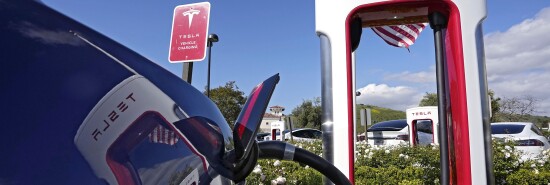
More states should reject California’s electric vehicle mandates
Washington Examiner
Video Embed
A backlash is growing against mandates forcing auto companies to make electric vehicles. Drivers now have enough experience to know that the vehicles are impractical, hideously expensive, and do not bring the environmental benefits claimed for them.
In a victory for common sense, Gov. Ned Lamont (D-CT) this week withdrew his own plan for future EV mandates four months after he announced it. The plan, modeled on that of California, would have required that by 2035 every passenger vehicle sold in the state be electric. It was nonsense. People don’t want the things.
ELECTRIC VEHICLES ARE A BAD BARGAIN FOR EVERYONE
Pushback against Lamont’s edict was bipartisan. Critics correctly said electric grid capacity is unlikely to be able to service a fully electric fleet and that charging stations would be too hard to find or too expensive to locate and maintain, especially in rural areas. They said less-wealthy families might not be able to afford EVs and that consumers should be able to choose what vehicles they want.
This week, too, a group of 4,000 auto dealers sent President Joe Biden a letter protesting his goal of forcing at least two-thirds of new vehicle sales to be electric by 2032. It was utterly unrealistic for several reasons. Despite huge government subsidies and manufacturer incentives, consumers aren’t buying fully electric models. They make up only 7% of sales. Costing $22,000 to $26,000 more on average than gasoline equivalents, electric vehicles stand cold and unsold on dealer lots.
Even if adequate numbers of charging stations were available, which is unlikely, EVs usually take more than 45 minutes to charge, compared to less than 10 minutes to fill a gas tank. After only 240 miles on average, electric vehicles need to charge again. So, their range is barely more than half that of a full gas tank. And the 240-mile range can drop to 160 miles in cold weather, of which we have plenty in the United States.
The manufacturing of batteries harms the environment and also serves China’s economic interests rather than those of America. China makes four out of every five EV vehicle batteries and owns or is buying most of the mines from which lithium and lesser quantities of cobalt, graphite, and nickel are extracted for battery production. Lithium mining can pollute air and water with heavy metals, greatly erode soil, use masses of water and energy, and disrupt wildlife habitats.
China also requires massive amounts of electricity to produce the batteries, a feat it accomplishes by burning coal under far less stringent environmental restrictions than apply in the U.S. Moving from fossil fuel production, for which the U.S. is relatively self-sufficient, to battery production, powered by dirty Chinese coal rather than clean-burning natural gas, pumps extra carbon and other poisonous particles into the atmosphere.
Even if one discounts the added environmental impacts caused by battery production and grid use, elimination of emissions from gasoline vehicles in the U.S. would have a negligible effect on climate — less than a fifth of one degree Celsius by the year 2100, according to one major study.
CLICK HERE TO READ MORE FROM THE WASHINGTON EXAMINER
All federal giveaways to EV makers, enticing them to produce cars the public doesn’t want and refuses to buy, have cost hundreds of billions of taxpayer dollars, adding to the deficits that drive up inflation.
No wonder the auto dealers balk, and no wonder even Democrats in Connecticut’s dark blue legislature joined the blowback that forced Lamont to abandon his foolish and unworkable order. Other states that have embraced California’s harmful EV mandate, including Virginia, should follow Connecticut’s lead.
